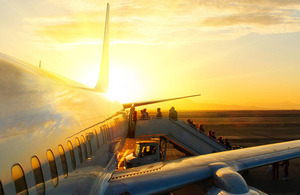
The Department for Transport has today (9 May 2019) published the final report from the independent Airline Insolvency Review, which was chaired by Peter Bucks.
The Transport Secretary Chris Grayling commissioned the review following the collapse of Monarch Airlines in October 2017, when 85,000 passengers were repatriated - in the UK's largest peacetime repatriation operation - by the Civil Aviation Authority.
The past decade has seen 2 of the largest airline failures in UK history, with the collapse of XL Airways and Monarch Airlines. In both situations, the government of the day took a decision to ask the Civil Aviation Authority (CAA) to intervene to assist the repatriation of passengers.
The review has considered consumer protection in the event of an airline or travel company failure and draws on lessons from the collapse of Monarch Airlines.
The key recommendations from the report are as follows:
- proposals for a new Flight Protection Scheme amounting to less than 50p per person, which would protect passengers if an airline became insolvent while they were abroad
- reforms to the UK's airline insolvency regimes so an airline's own aircraft can be used to repatriate its passengers should it fail
- improve awareness and take up of safeguards which protect customers with future bookings, when airlines collapse
Transport Secretary Chris Grayling said:
I welcome the report and I am grateful for the work performed by Peter and his team.
We will now consider the range of options put forward by the review, and will work to swiftly introduce the reforms needed to secure the right balance between strong consumer protection and the interests of taxpayers".
We welcome any views on the report's recommendations and encourage stakeholders to respond as part of the ongoing consultation on Aviation 2050, which closes on 20 June.
Chair of the Airline Insolvency Review Peter Bucks, said:
We know passengers expect to be protected from being stranded overseas if their airline should collapse, but in practice, each year many people fly without any such protection.
Although airline insolvencies are relatively rare, as we have seen in recent months they do happen - and at times have required government to step in to repatriate passengers at great cost to the taxpayer.
Our recommendations to government set out a series of practical suggestions to ensure that passengers are protected, particularly in the event of a large-scale collapse like Monarch.
Ensuring all passengers can get home requires organisation, funding and in many cases more than simply rebooking onto other flights. I hope that the work of the review will - while there is no silver bullet - act as a catalyst to ensure that both passengers and taxpayers are appropriately safeguarded when airlines collapse in the future.






